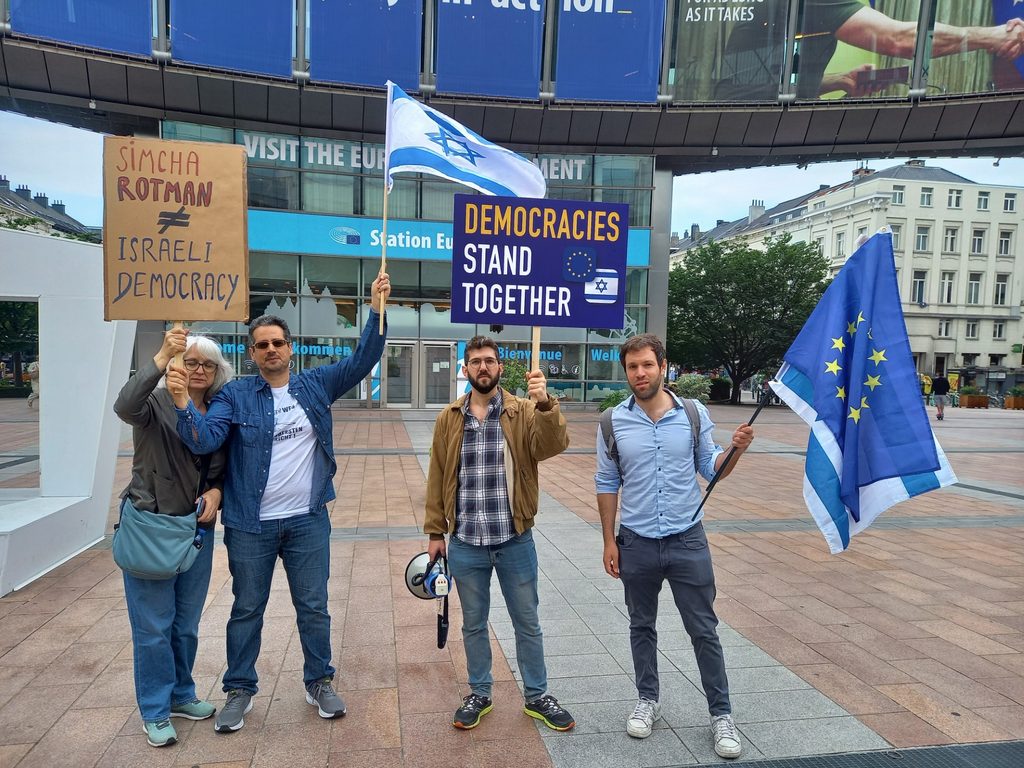A meeting of the Interparliamentary Task Force to combat online antisemitism took place this week in Brussels with parliamentarians, tech experts and representatives of major social media companies.
The event was partly overshadowed by protests against the invitation of Israeli parliamentarian Simcha Rothman from the far-right Religious Zionism Party. He is more known as chairman of the Constitution, Law and Justice Committee of the Israeli parliament (Knesset), where he is pushing through the controversial judicial reform and disciplining opponents for disorderly behavior.
Protestors in Brussels were surprised that Rothman had been invited by the European Parliament and also been welcomed by Margaritis Schinas, European Commission Vice-President for ‘Promoting our European Way of Life’. Schinas twitted on Tuesday that he had a “great discussion” with members of the task force and had been “happy to see the legislators from EU, US, Canada, UK, Israel working together to stop hate and discrimination online”.
The overhaul of the Israel systems of checks and balances has sparked mass demonstrations in Israel with calls for civil disobedience if the coalition government ignores the calls for a broad consensus solution.
In Brussels, protestors questioned why the European institutions had invited a person which in Israel stands for a judicial overhaul which risks undermining its democracy and the shared values with the EU. Some protestors coming from Israel entered the Parliament where they protested loudly against the invitation of Rothman but were told that they were talking to the wrong people.
Despite the current deadlock in the consensus talks that were headed by the Israeli president, Rothman started this week deliberations in his committee on a bill to exclude the “reasonableness” criterion in the judicial review of decisions taken by the government, ministers, and mayors.
This criterion has been used to judicial checks of arbitrary decisions and political appointments. In his view, the change would on the contrary serve “the democratic interest” by giving freedom to elected leaders to decide to implement the policies for which they were elected.
Despite his busy schedule, he took time to visit Brussels and attend the meeting of the Task Force. Asked by The Brussels Times about on-line hate speech in Israel, he replied that it has been discussed in his law committee but apparently more needs to be done, especially as regards incitement to violence.
The problem in Israel is hate speech and incitement against minorities and political adversaries which has increased since the new government took power. Ministers from Rothman’s own party have set the tone on Twitter by condoning riots by Jewish settlers in the West Bank and demonizing protestors against the judicial overhaul.
In the EU, a code of conduct was signed in 2016 with social media companies on tackling on-line illegal hate speech and harmful content, requiring them to remove or unable such content within 24 hours. Since then, more companies have signed the code which is regularly monitored by the Commission. During the years, bilateral meetings have been held alternatively in Brussels and Jerusalem on combatting antisemitism, racism and xenophobia.
A survey during the COVID-19 pandemic showed a resurgence of centuries-old conspiracy myths fueling new forms of antisemitism and an explosion of antisemitic online content in French and German on Twitter, Facebook and Telegram.
The parliamentarians at the hearing were critical against the social media companies for what they considered to be untransparent and lax enforcement of the rules or codes against on-line antisemitism. The companies monitor all types of hate speech but Rothman questioned why they could not quantify for example the number of Holocaust deniers on social media platforms.
A sensitive issue was the application of the International Holocaust Remembrance Alliance (IHRA) working definition of antisemitism. The definition, which includes examples of extreme anti-Israeli incitement, has been adopted by most EU member states. The social media companies, Meta, YouTube and Twitter, assured that their policy reflected the IHRA definition but could not confirm that it is applied in practice.
Rothman was twitting during the hearing: “I was asking YouTube if a sentence like ‘all Jews support apartheid and white supremacy’ is antisemitic and should be deleted but didn’t manage to receive a reply.”
As regards the judicial reform, he twitted his support for the Israeli Prime Minister: “An unfounded indictment was submitted and unprecedented investigations carried out, not to put to trial a person because of any offenses he had committed but to replace a serving prime minister.” The protesters claim that the extremist parties are blackmailing the Prime Minister to push through a legal coup which would enable him to escape justice.
At the end of the hearing, Rothman said he felt frightened by the on-line antisemitism and added that it was a government responsibility to ensure that it is deleted. Other parliamentarians described hate speech as a virus which is festering on social media because of algorithms that are designed to engage the users by enraging them.
“I appreciate the dialogue with the social media companies,” concluded David Lega, the Swedish MEP (EPP/Christian Democrats) who hosted the hearing as Steering Committee member of the Task Force. “But I’m not extremely happy with the results”. He hinted that the EU will sooner or later decide on legislation if the companies will not improve their performance when applying the code of conduct.
M. Apelblat
The Brussels Times

